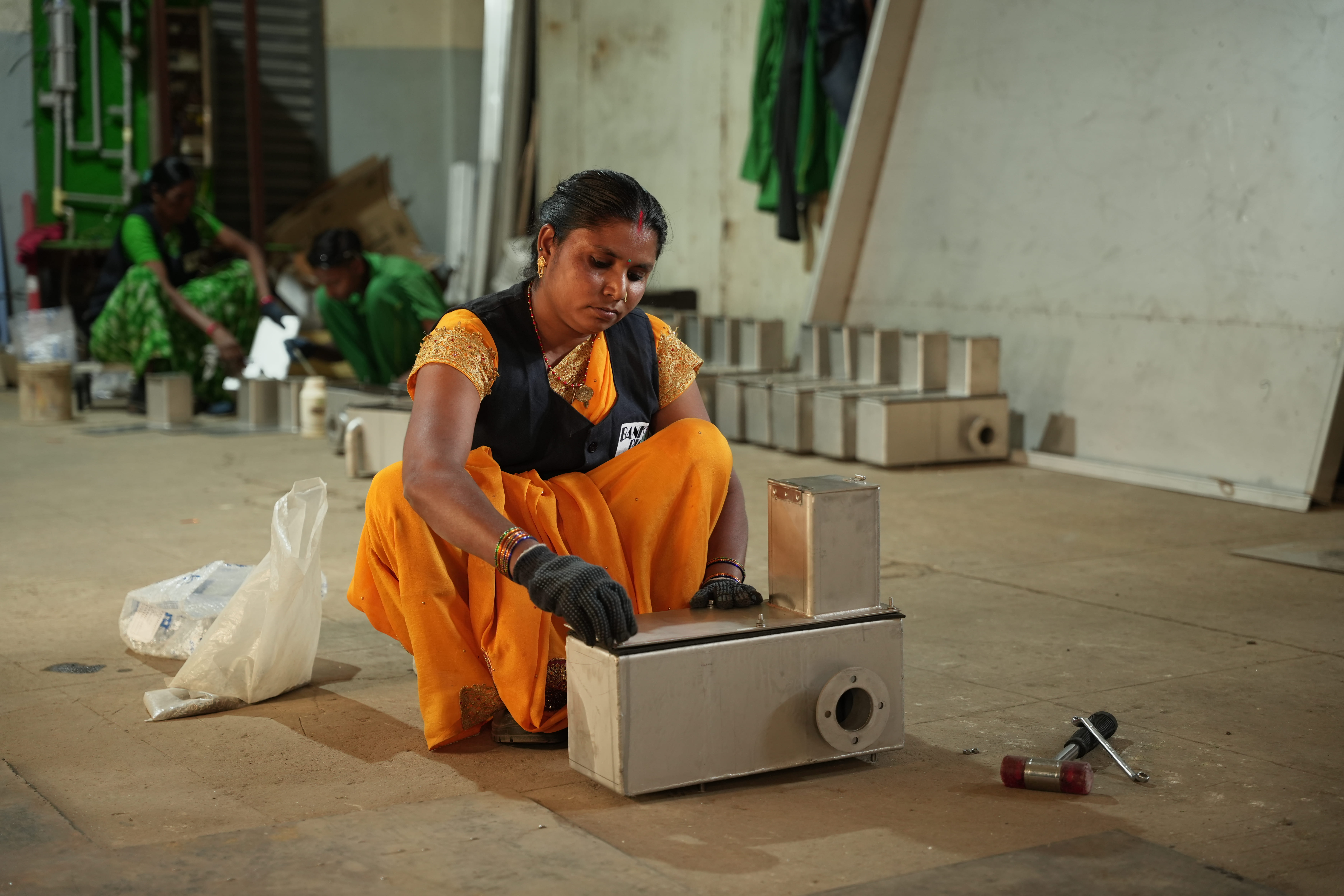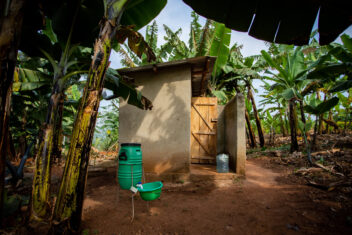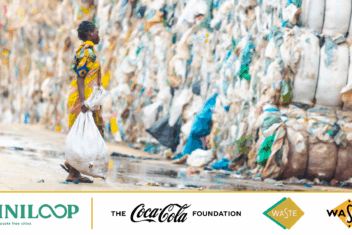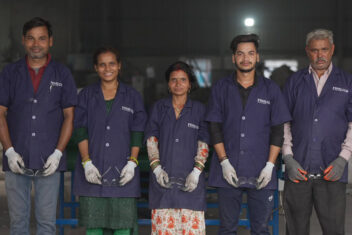More than a toilet | A matter of pride, dignity and human rights

Across the world there are a staggering 3.4 billion people who lack access to safely managed sanitation services. With the global population continuing to rise and climate-related disasters putting pressure on already stretched services, now more than ever we must work to change this reality.
In India, through our Take-a-Stake (TAS) initiative we are proud to be supporting an inspiring small and growing business who is standing up to this challenge by providing sustainable water and sanitation solutions– meet Banka Bio.
Banka Bio is a research-driven company developing an array of environmentally friendly products and services for human waste treatment and management, and is led by innovative business leader and mother of two, Namita Banka. Since its inception in 2012, Banka Bio has delivered and maintained over 12,000 bio-toilets, focusing most significantly on providing sanitation to Indian Railways, and recycled more than 5 billion litres of water. Namita kindly took the time to share more about this transformative work which you can check out below in our exclusive interview.
Why don’t you start by telling us what inspired Banka Bio?
My motivation was a personal one—my own health. There were no toilets where I worked, creating a very bad situation which meant I had to hold on for a long time creating many internal health issues. A challenge I knew that many women faced. I also noticed as a regular traveller on trains in India how dirty the toilets were and that the infrastructure was simply not working as the stakeholders didn’t understand the value of toilets and why they should be clean, particularly for women.
When I began speaking up about this, I started understanding the problem more and saw that it’s not just about toilets, it’s about the systems and people in place around them.
I happened to be working for Indian Railways at the time and as a kind of donation, I provided a service to them for four days providing portable loos in 2011. Whenever women used the toilets, they were thanking me, and it was this that made my heart realise how big this problem was and that something had to be done.
And how were you able to respond to this huge challenge?
Through researching I saw that NGOs were responding to this problem, but they could not get funding or achieve their goals, and I wondered why. India too was providing a lot of subsidies in terms of building toilets but still problems existed. From here I became very vocal with the government and started talking to many people, and in 2012 I started Banka Bio with the aim to work with Indian Railways very closely to improve their sanitation.
I offered our services to Indian Railways for free, successfully maintaining one set of train toilets for a whole year, and they saw the difference that dedicated maintenance of the toilets makes with cleanliness levels increasing.
In response to this we started building a manufacturing unit. At first, we used technology provided by the Indian government but I realised from our first order for 12 toilets that we were not going to be able to scale quick enough as they took three months to build. So, I started looking for modular structures and patented a design which allowed us to speed up the process.
At the same time sanitation was becoming a big focus of the government and the momentum began to pick up bringing in a lot of money. And people started realising that a toilet is not just a toilet, it is dignity, it’s a right for all to have a safe toilet at home and in public places.
The second part of the solution is the maintenance and sustainability, with water being a big factor in this. Many toilets become dysfunctional because there is no water, so bringing water and sanitation together is very important. Usually work is done in silos, you know, somebody working only on toilets and somebody else only on water. In the last three years we have combined both of those. Sanitation is the core, but we are also focusing on wastewater treatment.
And how are you developing technologies?
We recognise that there are many technologies already available in the market, but how you implement them is very important. The projects we run now focus on redesigning and making technology more efficient, understanding why existing infrastructure isn’t working and improving implementation.
So, what we do is take an asset as it is and completely refurbish it and then maintain it for seven to eight years in a contract and then we give it back to customers proving that the technology and implementation is working. We also work with construction companies and residential welfare associations to ensure when we hand the infrastructure back, they can keep it maintained.
I see that you now employ over 1,000 people and have delivered thousands of toilets, what has fuelled this growth?
Yes, that’s right. So, the key factor is that we have been delivering projects very well and remained focused on our core aim of providing sanitation infrastructure for one and all.
In the first 3-4 years of business, we spent time developing our design and since then have only focused on growth. With any technology, you cannot prove its success with just five installations. To date we now have 15,000 successful bio toilet installations so we can trust the technology because we have done large scale implementation across India.

And how are you ensuring this growth is sustainable?
We are not focused on simply one product. We’re focused on solutions. When we started there was no infrastructure itself, so we had to create the infrastructure to reach our goal. And now we are also covering sewage treatment when we provide a bio toilet.
We make sure the bio toilet waste goes into a digester where it is treated and the water which comes out is 99% pathogen free and it is safe to be discharged in the ground.
And we are always looking at what technology we are using and aware that it might change in the next five years with innovations happening that may enable to us to scale up our work.
We also noticed that often a blockage to growth is the funding so we thought OK, if the money is the problem, how we can we build a business model around it? So, we came up with the idea of Megaliter – a subsidiary of Banka Bio and subscription service for wastewater management, which is of course what brought in funding from Take-a-Stake. So, adapting to the needs of the solution is a critical part of our thinking and our sustainability.
Tell us a little more about your journey with Take-a-Stake and the impact of the support you received.
Take-a-Stake believed in what we were trying to do. And when we proposed the Megaliter model to them, they got excited as ultimately one of their goals is to provide safe sanitation too. They gave us our first debt funding enabling us to execute our first and second projects successfully.
With this success, financiers were able to see that our solution works and say yes let’s do more of this together and how can we scale to other countries. It becomes a rolling thing from there. This is successful. This is working. Let’s do it more.

The benefits each of us gets is also very important to me. Take-a-Stake has a mandate to support communities, by acting as a channel for funding. We can give them the value for the money they’ve invested and the impact that they’re looking for and at the same time we can grow.
This gives us more confidence each day that funding will keep coming in, to enable us to tackle a problem which we cannot get over in just one or two years. It needs to be long-term.
So, for businesses like yours that are working in this space and responding to social issues, how important are funds like Take-a-Stake?
They are very important because they add the first one litre of fuel to the motorcycle which is more important than the rest of the tank. That one litre gives you the energy to reach somewhere, and once you’ve reached there, then many people follow.
Take-a-Stake trusts that with the money you will reach your goal by travelling a new path, and then everybody sees it and says OK, this path is not that difficult.
So I believe Take-a-Stake has been a very important part because they invested early. We are now returning our debt funding to them which will help someone else. We pour from our bucket into somebody else’s bucket giving them the chance to grow their business, because now we have other funders.
Did you experience any barriers to investment?
One of the challenges is that nobody believed in what I was doing because they didn’t understand the problem. People living in urban areas never connected to the problem because if you don’t travel by train, you will not understand the sanitation problems people face travelling.
Sanitation is something which is very personal to people too, and when something is very personal, nobody talks about it, right? Even if I’m suffering, if I’m getting a urinary infection all the time, I will not talk unless I see somebody talk. When I began speaking about no toilets in India. Everyone began to say, I don’t have toilets in my village either. Somebody must start to talk.
At the time we started our work, there were companies and NGOs who were working on sanitation, but they were portraying it as a social service. They were not portraying it as a need, particularly for women. People didn’t understand that it is a matter of dignity, pride, human rights. But when we spoke about it as a human right, saying ‘Yes, I have a right to have a toilet. I have a right to have access to clean water’ people woke up.
But it was very difficult for me get to people’s heart. I have done more than 100 pilots free of cost because people couldn’t believe. Today however, there has been a shift of attitude among people in India and investments are ready, but there are not many proven models. So, it will take time, but I think in the next 5,10 years there will be a lot of people like us and I’m happy with that because it’s a huge problem and we can’t solve it on our own.

What’s your dream in the next 10 years for Banka Bio?
My dream is to scale and reach out to more people regionally and globally with the same kind of impact, especially in the Africa region where people are still suffering in the 21st century by not having toilets. If we begin today, in the next 10 years we can see the same kind of movement there.
And I feel a moral responsibility. Yes, it’s a commercial business, but I do feel a lot of moral responsibility to see how we can reach other countries also. I always say s**t is a serious business. That’s my trademark statement I don’t take it lightly as this work impacts lives. You know, we’re only 13 years in the business, and we are just at the tip of the problem, so I think we have a long way to go especially with the population and scarcity of resources only increasing.
A big thank you to Namita for taking the time to share her investment journey with us. If you would like to partner with TAS and support inspiring businesses like Banka Bio, or simply find out more, then please contact: [email protected]. Or why not meet another of the inspiring small and growing businesses TAS is working with by catching up with our previous interview with the WEEE centre in Kenya.


